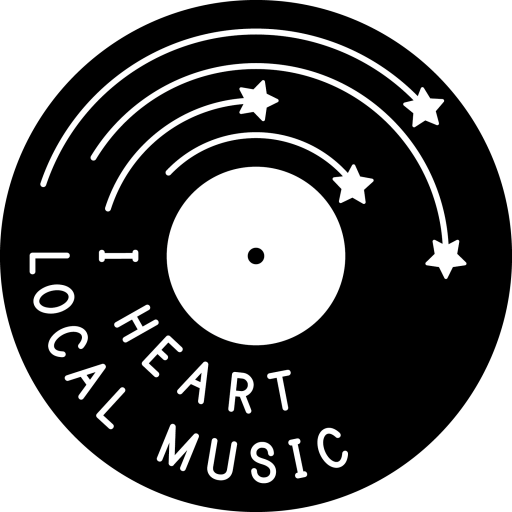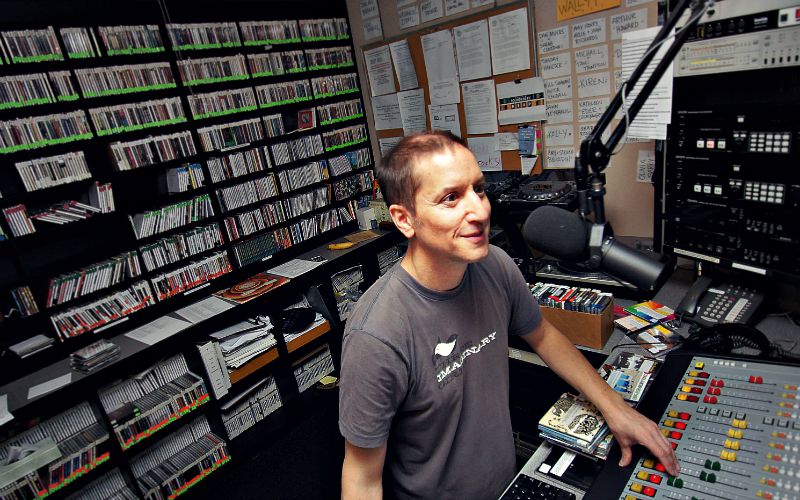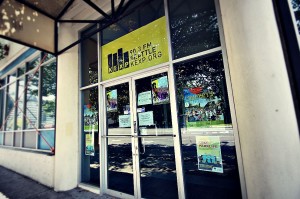 Editor’s note: I Heart Local Music spent time in Seattle this Summer and spoke with some influential players in the music scene. This is the first in a two-part series on how local bands can get exposure far beyond their region. Up first is a glance at KEXP, how it operates, and what it takes to get your music played on the station.
Editor’s note: I Heart Local Music spent time in Seattle this Summer and spoke with some influential players in the music scene. This is the first in a two-part series on how local bands can get exposure far beyond their region. Up first is a glance at KEXP, how it operates, and what it takes to get your music played on the station.
If you’re a fan of independent and alternative rock, then you’ve probably tuned into KEXP at some point. The non-profit radio station is based out of Seattle and broadcasts some of the most highly-regarded music to hit the airwaves. What makes KEXP well-loved across the nation is their casual approach to music and their accessibility to fans. The station began streaming in 2000 (back when it was still KCMU). Simply scrolling through their list of live in-studio performances is like looking at a who’s who of music. Basically, if a band can get some airplay on KEXP, they’ve got some street cred.
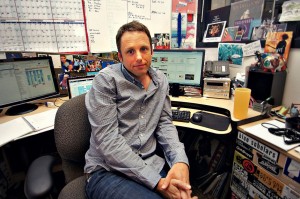 The reason for that has to do with one very simple rule implemented by the station. DJs will not play anything they don’t like. Commercial radio DJs don’t get to pick and choose what to play on the air, but Associate Program Director John Richards noted that the (relaxed) rules at KEXP are very different. “I don’t play anything I don’t like,” Richards states very matter-of-factly. The station usually has a rotation that’s about 200 releases deep, and most songs spend about three months in rotation. But if DJs don’t like the music, they won’t play it– and Richards won’t push a DJ out of their comfort zone. “We had a policy years ago to play four genres an hour, so it caused people to play different genres, and they played stuff that wasn’t very good. They’d really stretch and not do it right. So it eased into more “Let’s just make sure the right DJs are on playing what fits to their skills and their loves.'”
The reason for that has to do with one very simple rule implemented by the station. DJs will not play anything they don’t like. Commercial radio DJs don’t get to pick and choose what to play on the air, but Associate Program Director John Richards noted that the (relaxed) rules at KEXP are very different. “I don’t play anything I don’t like,” Richards states very matter-of-factly. The station usually has a rotation that’s about 200 releases deep, and most songs spend about three months in rotation. But if DJs don’t like the music, they won’t play it– and Richards won’t push a DJ out of their comfort zone. “We had a policy years ago to play four genres an hour, so it caused people to play different genres, and they played stuff that wasn’t very good. They’d really stretch and not do it right. So it eased into more “Let’s just make sure the right DJs are on playing what fits to their skills and their loves.'”
Programming for the People
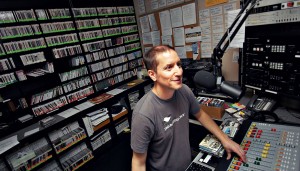 The station also makes connecting with listeners a must. “Our main mission is championing music and making sure we put music in people’s lives. Our community is an integral part of that whole thing, every step of the way our community is part of our programming,” says Richards, who requires DJs to get back to every listener. “We try to get to their request if we can, answer their questions, help create playlists for an event or a funeral, everything. I really feel strongly that you try to make an impact in each individual listener’s lives. It’ll encourage them to tell the story of KEXP.”
The station also makes connecting with listeners a must. “Our main mission is championing music and making sure we put music in people’s lives. Our community is an integral part of that whole thing, every step of the way our community is part of our programming,” says Richards, who requires DJs to get back to every listener. “We try to get to their request if we can, answer their questions, help create playlists for an event or a funeral, everything. I really feel strongly that you try to make an impact in each individual listener’s lives. It’ll encourage them to tell the story of KEXP.”
There’s a reason why telling the story of KEXP is essential. It plays a significant role in the local music scene. But really, it’s a give and take relationship. The local scene in Seattle needs KEXP, and KEXP needs those local bands. “Without local music, there is no KEXP,” says Richards. He calls the local scene the bread and butter of the station, which is what early programming centered around. “We play local music every hour, that’s a rule we’ve never had to enforce. I’ve never looked at an hour and said you’re not playing enough local music. We just naturally do.”
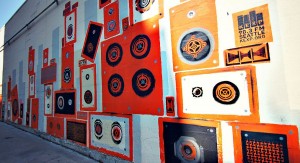 But the station doesn’t just rely on working with local bands, they’ve also been diving into working with regional non-profits. “I started these shows where we do other showcases for nonprofits. We do it monthly at different clubs with different bands,” he says. “In theory, you’re giving the air time to non-profits. You’re giving money to the non-profits, and then people are going to the shows, discovering local bands, and helping non-profits.” This is a tactic implemented similarly by Midwest Music Foundation, a non-profit out of Kansas City that puts local and regional bands on big stages to raise money for programs that help musicians with healthcare costs (I Heart Local Music supports this concept by sponsoring a showcase at the foundation’s Midcoast Takeover event at SXSW).
But the station doesn’t just rely on working with local bands, they’ve also been diving into working with regional non-profits. “I started these shows where we do other showcases for nonprofits. We do it monthly at different clubs with different bands,” he says. “In theory, you’re giving the air time to non-profits. You’re giving money to the non-profits, and then people are going to the shows, discovering local bands, and helping non-profits.” This is a tactic implemented similarly by Midwest Music Foundation, a non-profit out of Kansas City that puts local and regional bands on big stages to raise money for programs that help musicians with healthcare costs (I Heart Local Music supports this concept by sponsoring a showcase at the foundation’s Midcoast Takeover event at SXSW).
Patience and Perspective
With a strong support system from listeners and the community (as well as a generous donation from Microsoft co-founder Paul Allen), KEXP is free to focus on the music that hits the airwaves (and internet streams). Naturally, they show strong support for the locals, but Richards’ inbox is flooded with emails from bands across the country seeking airplay. He wrote a blog post on what bands need to do to get their music on the radio, but Richards says bands need to be open to feedback. “The biggest fan of a band is the band, so it’s hard to have perspective. Listen to what others say. There has to be a bar. If we let every local band get airplay here, there’s no authority,” he noted. “We don’t base it on label or genre, we just base it on if we think the songs are good. If you’re not getting airplay from any of the DJs, that’s a sign you need to work on it. My advice is to be patient and listen to feedback. If there is feedback, take it. If there is airplay, take it as a sign that you’re doing something right.”
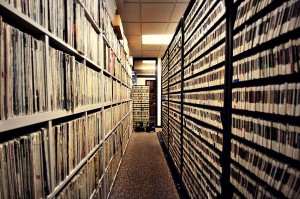 Bands should take Richards’ advice to heart. KEXP, inevitably, is where you’ll find some of the most interesting music around. This is what keeps the station growing a little more every year, and there’s little signs of stopping. They’re about to head into a new building next year, which will extend their reach massively. It’s a lot of work, a lot of fundraising, and a lot of keeping in tune with what listeners want. It’s also an exhausting job for Richards and all the volunteer DJs, but it’s a task they’re keen on. “I keep doing it because it’s the greatest job in the world,” Richards proudly proclaims. “Every time I think there’s a ceiling and we’re going to hit it, we just bust through it… I cant’ imagine myself not wanting to do it. It’s just too amazing what we’re doing here.”
Bands should take Richards’ advice to heart. KEXP, inevitably, is where you’ll find some of the most interesting music around. This is what keeps the station growing a little more every year, and there’s little signs of stopping. They’re about to head into a new building next year, which will extend their reach massively. It’s a lot of work, a lot of fundraising, and a lot of keeping in tune with what listeners want. It’s also an exhausting job for Richards and all the volunteer DJs, but it’s a task they’re keen on. “I keep doing it because it’s the greatest job in the world,” Richards proudly proclaims. “Every time I think there’s a ceiling and we’re going to hit it, we just bust through it… I cant’ imagine myself not wanting to do it. It’s just too amazing what we’re doing here.”
You can listen to KEXP here, and follow some of their adventures over on their blog.
Words and photos by Fally Afani
